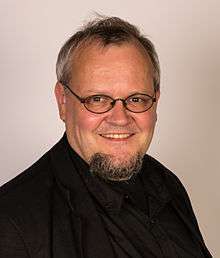Tobias Pflüger
Tobias Pflüger (born 1 February 1965 in Stuttgart) is a German politician and former Member of the European Parliament (2004 - 2009). He represented the Die Linke, part of the European Left and sat on the European Parliament's Committee on Foreign Affairs. He was a substitute for the Committee on Economic and Monetary Affairs, substitute for the Delegation to the EU-Croatia Joint Parliamentary Committee.

Tobias Pflüger in May 2014.
Education
- 1985: School-leaving certificate, Otto Hahn grammar school, Nagold
- Studied politics and empirical cultural affairs at University of Tübingen
- Activist in the peace and anti-nuclear movement since the 1980s
- from 1989 to 1993: Personal assistant for two Green Members in the Baden-Württemberg Regional Assembly on anti-nuclear affairs, energy and peace policy
- In 1996 founded and set up Information Agency on Militarisation e.V., Executive member and spokesman at home and abroad
- Editor of the online magazine IMI-List (approx 1000 subscribers)
- 2002: Scholarship from the Rosa Luxemburg Foundation, January–December
- 2002: Active Member of the Attac research committee since late[1]
- 2004: Participated and lectured at European Social Forums in Florence (2002), Paris (2003), London (2004) and the World Social Forum in Mumbai
- Active Member of the DFG-VK (German peace association - united opponents of war, http://www.dfg-vk.de)
- Member of the BUND (Association for Nature and Environmental Protection)
- Member of VCD (Germany transport club)
- Member of the VVN-BdA (Union of Persecutees of the Nazi Regime)
- Member of the ver.di trade union (Subject area 8 in Baden-Württemberg)
- Member of the dai (German-American Institute, Tübingen)
- Executive member Information Agency on Militarisation e.V.
- Member of the Rosa Luxemburg Foundation
- Member of the Rosa Luxemburg Forum, Baden-Württemberg
- Spokesman for the Baden-Württemberg, Bavaria, Rheinland-Pfalz and Saarland PDS regional associations
- former GUE/NGL Group coordinator on Subcommittee on Security and Defence (SEDE)
- former Member of the European Parliament Peace Initiatives Intergroup
gollark: We made Haskell 2030 last week, it was very cool.
gollark: Interesting idea. You could do that.
gollark: Oh no, is it using !!MUTABLE STATE!!?
gollark: So how does the lawyer work?
gollark: Wait, testbot isn't actually here anyway.
References
- "ATTAC Scientific Advisory Board" (in German). Archived from the original on 27 February 2012. Retrieved 21 May 2012.
External links
| Wikimedia Commons has media related to Tobias Pflüger. |
- Official website

- Personal profile of Tobias Pflüger in the European Parliament's database of members
- Declaration (PDF) of financial interests (in German)
This article is issued from Wikipedia. The text is licensed under Creative Commons - Attribution - Sharealike. Additional terms may apply for the media files.